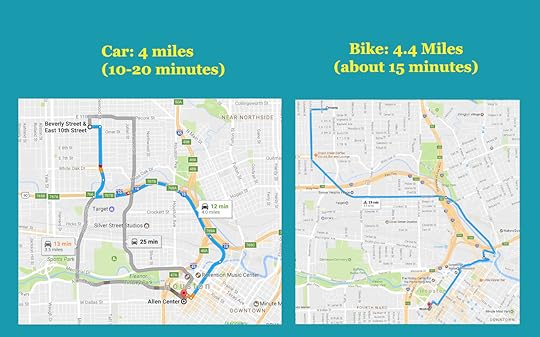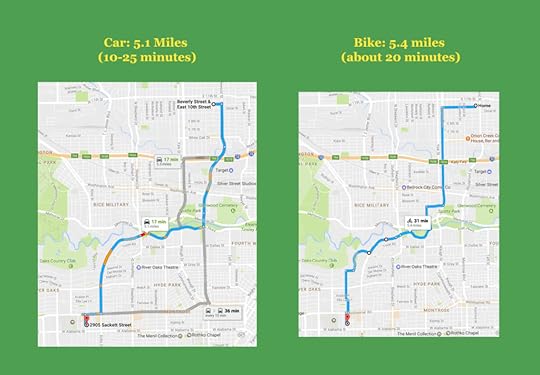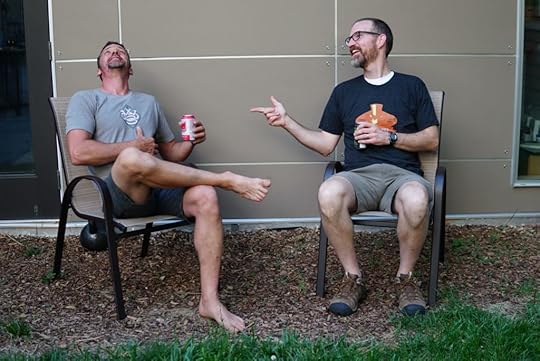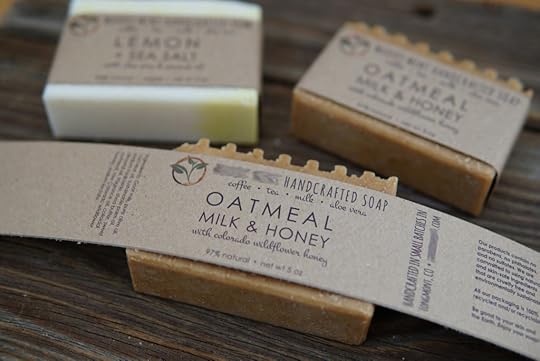Mr. Money Mustache's Blog, page 8
June 8, 2017
Houston Attorney Thrives on Doing The Impossible – Daily
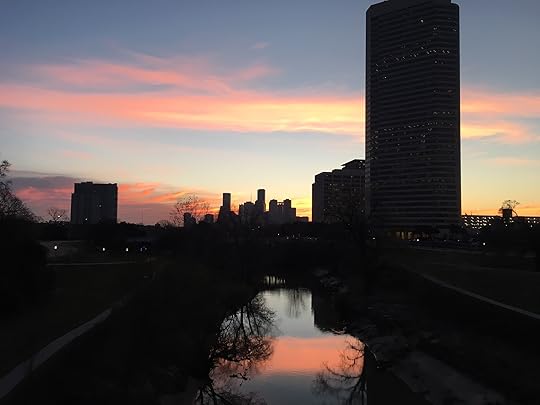

Some of Houston’s cool and under-appreciated bike infrastructure.
In this extremely wealthy country of ours, the chief barrier to wealth is often the information, or misinformation that gets stuck inside our own heads.
People with the right knowledge can develop the right habits, and these habits lead them to accumulate wealth very quickly. Meanwhile, the majority of people pick up incorrect financial ideas and bad habits, leading to permanent debt. But they mingle mostly with their own type, so the failure habits keep spreading.
Sometimes, to break out of the Herd Mediocrity Mindset, you just need to see an example to learn what is possible.
So with that in mind, let’s review an example of yet another allegedly completely impossible thing, that an MMM reader is doing every day.
Jeremy Stone, aka The Rock, engages in a rare – and yet incredibly profitable – activity, in a city that is legendary (in the public mind, anyway) for making this activity completely impossible.
The following tale is drawn from our past year of occasional email conversations.
The Lawyer Who Actually Bikes to Work.
Year-Round. In Houston.
Dear Mr. Money Mustache,
“I’m a lawyer and commute to downtown Houston every day regardless of weather (unless I need to drive somewhere for work), without a handy shower or any special amenities, so it can definitely be done.
I was skeptical too, but my wife pushed me to do it after we got into your blog about 4 years ago, and it’s been one of the best decisions we’ve made. If anyone complains that they can’t do it because of heat, humidity, needing to dress in a suit, etc, I’m proof that you can do it.”
The Challenge:
Throughout the history of this blog, Houston has become the poster child of Bike Excusitis Disease – the place most often cited as “The Reason I Can’t Bike to Work”.

Houston commuting, as perceived by car drivers (image credit: Politico)
Raised on the slippery black teat of the Almighty Oil Well, Houston was developed for motor vehicles and the metro area now sprawls across ten thousand square miles (6.4 million acres), which means Houston alone is one fifth the size of the country of England. Ironically, the more you optimize a city for cars, the bigger your traffic jams, so Houston has the worst traffic in the US.
And it’s a subtropical steam bath: daily highs exceed 80F / 27C for a full nine months of the year with high humidity year-round.
On top of that, Mr. Stone is a high-ranking official in a law firm, the profession most often cited as one where you can’t bike to work. Lawyers need to wear suits at work, see clients, impress judges, and this calls for the utmost in personal hygeine – scrubbed skin, shaved beards, polished shoes and manicured nails, premium brands and styled haircuts. It’s a hassle, but it is a necessary selling of the soul, in exchange for a six or seven figure income. Right?
With those painful complaints out of the way, we might as well move on to actually solving our problem.
“At first, I thought it was a crazy idea. It wasn’t, and I loved it.
I started commuting on an old but good Trek mountain bike (got stolen), then to a $50 hybrid that was a piece of crap, then upgraded to a fancy Surly Disc Trucker.
Most of this route is nice and easy, because it is mostly on a hike/bike trail. Over the last few years, Houston has been changing old railroad lines into these trails.”
The Route:
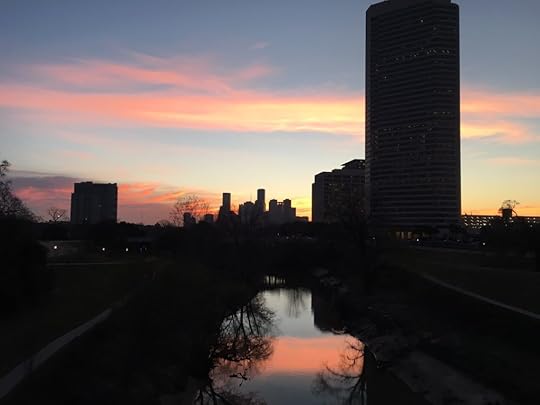
Sunrise in Downtown Houston, as seen from the bike route.
Bike commuting can be superior to driving in every city, but only when you design a route that works for riding your bike. When you drive a car, you will usually end up on the fastest, widest, (and most dangerous) roads, never even realizing that there were parallel bike-friendly options nearby.
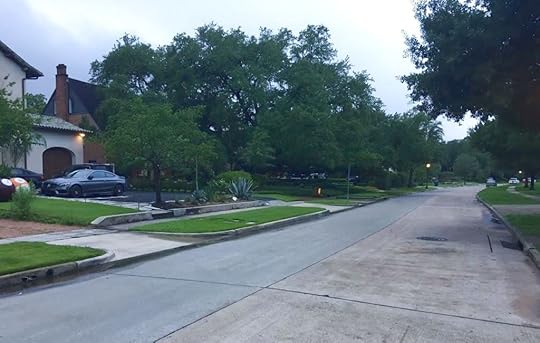
“My route takes me through a neighborhood called River Oaks, where the very richest Houstonians have lived for decades.”
Early in our conversation, Mr. Stone shared a map of his bike route with me, and I compared it to Google’s suggested route for driving a car downtown. The distance is about the same, but in a car you end up on the interstate highway, which makes the commute seem completely un-bikeable.
Fig.1: Google Maps view of car vs. bike routes to work. Bikes are surprisingly fast, plus immune to traffic jams and you get free parking.
Key Strategy Note: this ride was made much easier by the fact that Stone lives within 4 miles of work. This didn’t happen by accident: he chose his home and his work strategically to avoid a car clown commute.
Yet interestingly enough, houses in his neighborhood are still only in the $300,000s. If homes so close in are so affordable, why is anyone commuting into downtown Houston in a car?
There is no answer aside from sheer foolishness – those highways will soon be empty after this article gets out.
“My route takes me along the trail along Silver St. in an old Warehouse district, now an artsy district. Then along White Oak Bayou (Houston is built on bayous, not rivers!) as you near downtown, and under an old 150 year old bridge that has been built over.
Some of these bridges serve as homes for the thousands and thousands of bats here. You can’t see them, but I took this picture at about 6 or 630 am, and there were bats flying all around. The bridge is so low you get to ride right through them!
Biking beats driving – exercise, fun, no traffic, bats, tombs, turtles, snakes, herons!”
The Speed:
The deceptive thing about bikes is that within a city, your average speed ends up equal to, or even faster than, a car. In big cities, cars average only about 27 MPH even without traffic, and rush hour can cut this speed in half again. Meanwhile, a slow beach cruiser coasts at about 12MPH (the speed Google uses for biking estimates), a fit cyclist rolls at 20, and an electric bike can easily sustain 28 MPH with almost no effort from your legs at all.
So when I’m in a rush to get somewhere in town, I never reach for the car keys – there’s no time to waste puttering around in a gas-powered wheelchair.
The Cars (and other Financial Effects):
Most people in Mr. Stone’s position have huge houses in the wealthy enclaves of Houston, and drive very high-end cars to work. If there is a spouse and family in the picture, they have multiple cars. And yet somehow, the Stone family survives with just one 2006 Honda CRV (market value about $6000), which remains in great condition because it leads such an easy life.
Driven lightly, the total cost of ownership of a car like this is about $2000 per year. Meanwhile, the typical attorney power couple might keep an up-to-date Mercedes SUV and a BMW 5-series. Driven at the US average level of 13,000 miles per year, this fleet would vaporize about $24,000 per year of personal wealth.
Wow, we need to put that shit into a box so more people will see it:
Average family driving
with two typical lawyer-level cars
destroys about $250,000 of your wealth
every single decade.
Still think biking to work is only for poor people? Do you consider an 11-year-old vehicle beneath your standards?
When you are not dependent on cars, you no longer derive your identity from them, which means you can start thinking about them like the appliances they really are. This makes your car costs drop drastically.
But What if I Move Jobs?
Coincidentally, halfway through our conversation, Stone ended up switching employers and acquiring an even better position.
I imagine that the same sharp mind and optimistic can-do attitude that encouraged him to bike to work, were the things that helped him earn this upgrade. But the new office was in a different part of town, further from home.
Did The Rock head straight to the car dealership to purchase a new Chevrolet Suburban like everyone else in Houston? No, of course, he just busted out the map and the brainpower again.
But What About the Heat?
“Until the new job, my office did not have any shower facilities. But I found it was not really a problem: I just keep my clean dress clothes at work, and change out of my cycling clothes once I get to the office.
Also, making the trip before sunrise (especially in the summer) gives me much cooler temperatures. The ride home can be hot and sunny, but there is always a cool shower and air conditioning waiting for me when I arrive.”
Rock is right. I too biked to school and work throughout my career, in temperatures ranging from 0F to 105F. Long-time readers already know that bike transportation is probably the biggest factor that accelerated, and continues to fuel, my own family’s early retirement.
Some of my workplaces had showers, and others didn’t – but I never even felt the need to use them. In extreme heat I’d just just put on a clean, dry shirt and maybe a fresh layer of speed stick, and settle in to my office to enjoy the air conditioning. Any trace of perspiration or heat was gone within about five minutes.
This is because physical activity, including riding your bike, is normal, not the exception. It’s not a medical procedure or a competition or something you do in an indoor “spinning” class. It’s not an emergency condition which causes your body to shoot feces from every pore, destroying any nearby pieces of clothing and requiring a long, hot shower every time you move so much as a fingertip.
It’s just what happens every day. So The Rock and I will see you on the streets tomorrow morning – it’s always Bike to Work Day.
—
Related Reading on the magic of a Cooperative Spouse:
Is Mr. Money Mustache Ruining Your Marriage – Part 2
Is Mr. Money Mustache Ruining Your Marriage? – Part 1
Epilogue
On the day that I finally got around to publishing this post, Jeremy and his lovely wife happened to be visiting my part of Colorado for a wedding and some hiking. So we invited them over for dinner and we had a great time together. I also gave him one of the secret stash of MMM t-shirts that arrived at my place today:





May 19, 2017
Exposed! The MMM Family’s 2016 Spending!
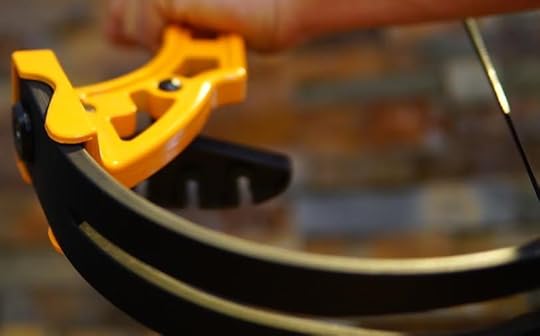
Well, I might as well come clean on our spending for last year. It either went up, or way up, depending on how you want to account for things.
Every year, this annual report seems to come out a little bit later – mostly because I’m no longer all that interested in how much money we spend. And Mrs. Money Mustache, my faithful assistant in creating these reports in past years, has disappeared completely from the blog – justifiably more interested in her Etsy Shop than family finances. Such is the nature of retirement.
If you are early on in your journey to financial freedom, you should not do what we are doing. Until you have your finances on auto-pilot so that you are saving 50-75% of your income, you should absolutely be reviewing every piece of spending and adding up all the categories.
(Related Article: How Rich are You? How to find your Net Worth and Savings Rate)
But we’re all done saving for retirement. Our cash outflows feel both luxurious and reasonable, and they are well below the retirement income budget, so it seems less and less necessary to measure them.
After all, if you are happy with your body composition, do you still need to keep measuring every calorie you eat? If your breathing is clear and uninterrupted, do you track your annual number of breaths?
But our Supposedly Low Spending has kind of become my brand. And because of that, there are even conspiracy theories that form around this spending:
“There’s no way he’s making that much money and only spending $25k.”
“Oh, looky there.. Mustache bought an electric car as an “experiment”. I wonder if that will show up on their annual spending!”
“How much of his [travel/entertainment/home renovation/marijuana] expenses is he hiding from us as business expenses?”
So I thought I could do things a little differently this year. I can share the normal family expenditures as well what our businesses spent, and everything in between.
The Basic Expenses
Here’s the familiar chart, updated for 2016, complete with last year’s numbers for comparison.
Category20152016Comments
Mortgage Interest00If we had a $400,000 loan at 4%, we would have paid $16,000 in interest (!)
Property Taxes14111895Massive house price increases in my neighborhood come at a cost (prices have doubled in 4 years).
Food and Dining7,4006,807
Groceries 6,232 5,980A warehouse store opened up in town, within biking distance of home. This reduced grocery costs a little as I shifted more purchases there. See article: Killing your $1000 Grocery Bill
Wine/Beer 627 321Fewer large parties this year (boo), plus we cut down our glass-of-wine-or-beer-with-dinner habit (yay!). But many people have been giving me free boxes of beer in exchange for helping them with stuff, which probably makes this cost artificially low.
Restaurants, Coffee Shop 541 506Mrs. and Little MM started ordering fancy pizza deliveries every time I'm out on a trip.
Medical3,73310,868Here's where the costs went way up this year.
Doctor Visits 0 3807My poor little lad broke his arm on December 30th (fell from a play structure while playing with me!)
Health Insurance 3,000 6720A new Kaiser health insurance plan. (A downside of the ACA for those with higher incomes)
Dentist 256 256
Pharmacy 42 0Aspirins, bandages, toothbrushes, and such included under "groceries". Thankfully no prescriptions for any of us this year.
Physical Therapy 435 0
Auto and Transport945490
Gasoline 332 1051 snowboarding trip, plus assorted errands in the van.
Insurance 357 449Cost increased in September due to newer car (Nissan Leaf).
Still fantastically cheap thanks to Geico
Registration & Testing 169 75
Express Tolls and Uber/Lyft 0 70Still taking Uber/Lyft to the airport instead of driving. Much cheaper than driving/parking, especially if you have some referral credits.
Service & Parts 88 0Both vehicles in top shape this year, no scheduled maintenance intervals reached. I'll definitely be buying some windshield wiper blades in 2017 though.
Public Transportation 0 0Nothing against the bus, Bikes are just faster
Utilities16521,575Electricity, Gas (heating, cooking), trash/recycling, city park fees, etc.
Cell Phone5396002 smartphones with data on Google Fi and Republic Wireless
Internet Access692540I negotiated a lower rate for part of the year, then ditched Comcast for Longmont's amazing Gigabit Fiber service ($50/month for 1000 Mbit/S access! - Nerdvana!)
Home1696
Home Renovations120 1696Finish materials for my house and the homes of some friends/family. Does not include the $30k detached Studio I built.
Home Insurance0 0Still self-insured for the primary house. Please don't complain about this in the comments section ;-)
Gifts/Donations1,7472000Does not include donations made by the business.
Crossfit/Yoga230150
School Tuition00Little MMM was back to 100% public school this year, due to increased confidence/toughness in getting over anxiety. Go little man! But we also do a shitload of learning at home, because it's fun.
Misc30952,564
Shoes & Clothing 754 622Lots more fancy stuff for the gang from Gap, Old Navy, etc.
(my clothes are mostly free stuff, thrift shop or included in grocery receipts from Costco)
Sporting Goods 0 98Sweet Compound Bow and arrows!
Shopping Misc 1,274 1000Mostly at Amazon - household/kitchen goods and computer parts
Books, games, gifts 488 383
Other 580 422Stuff I am too lazy to sort out. If something is not listed, assume it is here.
Travel2,3762,335Flights to Florida in January, Canada in July and December,
TOTAL$23,941$30,193Adding in our artificially high medical costs is what did this budget in.
Subtracting Tuition, Donations22,194 28,196
Subtracting travel, crossfit19,588 25,861
Subtracting organic/luxury food17,531 23,614Assuming a 33% increase on groceries due to organic + meat.
Subtracting home renovation expense17,411About $22,000This is what our "no frills" living cost would be (although you could subtract another $6,000 if we had a lower income and qualified for the health insurance subsidy)
So What is Mr. Money Mustache Hiding From Us?
In a word: Nothing – this is my best guess at what our true expenses would be, if we lived a normal, retired life.
But here are the exceptions and special situations, which you can account for however you like:
Higher Income is forcing me to pay full-price for health insurance. Health insurance pricing comes on a sliding scale from “nearly free” below $25,000 in family income, up to full price for incomes over $80,000 (see subsidy calculator)
But then again, our family business (of which we are employees) pays these premiums on our behalf, so they are pretty painless
I built this nifty studio, spending about $30,000 in the process. Is it spending, or investment? Since it increases the value of the house by much more than that amount, and I will be selling this house and moving somewhere else eventually, I chose to treat it as investment. On the other hand, spending money on repairs, changing paint colors, gardens, or swimming pools would count as spending to me, since these items are more likely to be recurring and/or not recouped at the time of sale.
I bought a Nissan Leaf for roughly $14,000 after all costs. This was $9,000 more than I got for selling the old Scion xA. Is this spending? Well, I definitely would not have bought it if it weren’t for the blog (it served as a strong form of advocacy) and I think it may have actually made a noticeable difference in US Leaf sales numbers – which was my main purpose. Sure is a nice car, but we barely use cars for personal purposes (I had to become an Uber driver in order to even get enough drive time to properly test the car!)
In late 2016, I gave away $100,000 of this blog’s income to various charities, with much more to come. Having a business that makes and gives away money probably reduces the need to give away my real retirement savings.
Travel as Mr. Money Mustache (trips to Ecuador, Los Angeles, Portland, Seattle, and a couple of other places) added up to about $4,000 between flights, hotels and food. None of this is stuff I would have done for personal fun, but it may have burned me out enough that I skipped or missed other personal trips (camping, etc) that would have increased my travel spending.
Mrs. Money Mustache’s Etsy shop spent more than $20,000 on materials, shipping, tools, etc. Most of this went right back out the door and earned a profit, but you could argue that both of our business expense accounts satisfied our “spending desire”, displacing personal spending in some way. In fact, writing for you consumes so much of my limited free time, that it may prevent me from expanding into other, more expensive hobbies (like upgrading my mountain bike or snowboard gear).
Overall, it looks like another fairly reasonable year. The biggest lesson that I try to emphasize is that spending does not have to scale with income. We spent less than 10% of our taxable income this year, and still cannot see any reason to inflate the lifestyle any further than it is already.
It’s a beautiful life!
Unrelated but Special Thanks to a Reader: Over the last few months, a lot of technical stuff has gone on behind the scenes here. If it weren’t for some serious help from skilled tech people, this blog’s heavily used forum would no longer be functioning.
I wanted to thank Kevin Clack – aka Clack Consulting for stepping in to upgrade the forum and continuing to help me with necessary fixes to this day. And if you have a well-established business with technical and web presence needs, you may even be able to become one of his clients as well.





April 25, 2017
There Are No Guarantees
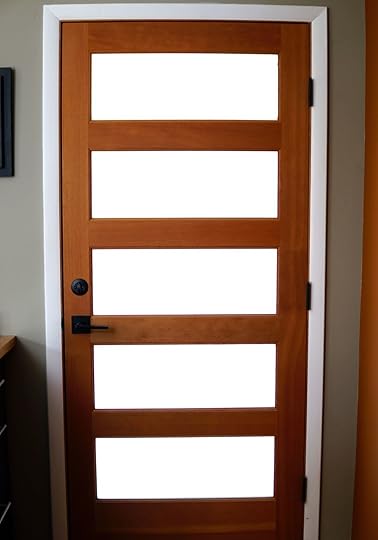
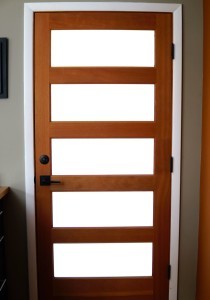 You know what I have come to realize is almost always ridiculous? Contracts.
You know what I have come to realize is almost always ridiculous? Contracts.
Contracts, paperwork, and bureaucracy. Guarantees, warranties, and excessive caution in an attempt to ensure a trouble-free future. Not all of it is bullshit, but the older I get, the more I realize that a surprising portion of it is.
I mean sure, if I’m Tesla and you are Panasonic, and we’re partnering to build the world’s largest structure and produce the majority of the world’s energy storage products, and we each have thousands of employees involved in the process, we can write up a contract and sign it.
But if I invite you over to my house for one of our customary Sunset Beers in the Park events tonight, how appropriate would it be for me to send along a little PDF contract with five places for you to sign?
I, Jane Mustachian, agree to arrive at the Mustache residence between 5 and 6PM, and consume between 1 and 5 servings of beer and/or wine, over a period not to exceed six (6) hours, to convey myself to and from the event using only muscle-powered transportation… blah blah any food served may or may not contain nuts or gluten… agree to not to hold Mustache family liable for any injuries.. and so on.
You’d think I was crazy, and find another place to have your beer tonight.
We understand this at the social level, and even at the small business level, if we feel a high level of trust. But as soon as we lose our trust and get overly fearful, we start breaking out the lawyers and the contracts and the stifling formality.
It is at this point, I argue, that life starts to suck.
It’s also the point at which a company starts to suck – that moment when it loses its soul and its freewheeling joy, and starts pushing for profits above ethics, and the lower level employees are not empowered to do what they know is right because their boss would have to ask the next level boss and the request would die before it reached someone with enough authority.
This is also the point at which I try to avoid doing business with a company if at all practical, and find a smaller one who could use a new customer.
And therefore I think we can make our lives better if we raise that threshold of fear a little bit, and start running our businesses and our lives as if we were big boys and girls.
Here’s another story which illustrates this point:
On the “contact” section of this website, I have a little note that says people should not email me with requests for marketing partnerships, TV shows, book publishing, etc. Through experience I learned that those activities not nearly as fun as they sound.
But one guy snuck through the gates – “Hey man, I work for a big company but don’t worry, I’m cool – I just have some ideas for a TV show about Mustachian lifestyles and wondered if you want to talk about them.”
So we talked on the phone, and he was indeed cool. It was a nice concept and a respectable company and they had done other successful stuff. So I said I might help out with the project occasionally, as time permitted.
Suddenly, a completely unrelated person from their legal department started emailing me contracts and agreements and such – pages of them! The contracts contained obligations, promises, and bullshit galore.
And here I was just naively thinking I’d have a beer with this creative writer and laugh about some ideas for a TV show. We had already agreed on the phone, that if the project ever ceased to be completely fun – for either of us – then we’d just drop it. Retirement is is too short to engage in non-fun projects, because there is already an enormous queue of extremely fun projects that I haven’t even had time to start yet!
So I told the lawyers thanks, but I wasn’t interested in contracts. But I’d still be happy to help out just as I had originally offered.
And I never heard from anyone at the company, or the creative guy, ever again.
I felt like I had been stood up – the whole thing had been a small waste of time. But I was grateful that I hadn’t actually dug in on a big project with an organization that works this way – for that would have been a much bigger waste of time.
Let’s contrast this with a a few other business arrangements.
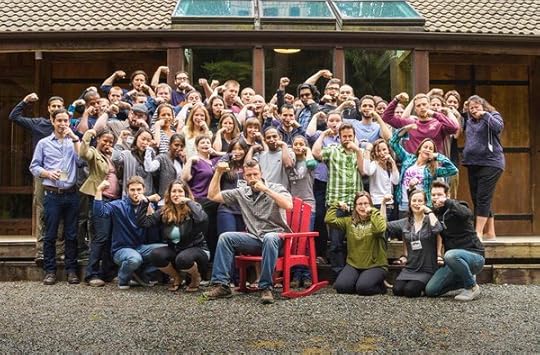
Figure 1 – Camp Mustache
I have fixed up plenty of houses with local friends, with many thousands of dollars at stake. Sometimes even lives or limbs, as we scrambled around like monkeys to cut down tall dead trees. No contracts, just plenty of dirt, scrapes, laughs and good times – and profits, too.
I’ve done several interviews and trips with Jesse Mecham, founder of You Need a Budget. Significant value accrued to both of our businesses from these collaborations as thousands of YNAB customers became Mustachians and vice versa, and yet somehow it never occurred to us to make up a contract.
Next month I’m traveling to Portland – first to visit Treehouse founder Ryan Carson and do some social stuff that might also have promotional value for his business. Maybe record a video and a podcast, and even host a gathering of Mustachians right in the courtyard of their central Portland building. With beer!
No contracts, of course.
Then on to Seattle to attend Camp Mustache – something that is now a popular recurring event. Although there are tens of thousands of dollars involved in putting it on, it’s an informal not-for-profit arrangement and the organizers and I have never signed a contract.
But What if the Other Person Breaks their Promise and I Get Screwed?
You may think I’m painting an unrealistically rosy picture here. Not everything always turns out for the better, right? Business partners sometimes turn evil, tenants stop paying rent, girlfriends or boyfriends dump you, products break, stock markets crash, bones break, and fatal diseases strike your loved ones.
I agree – life has been known to serve up the odd Platter of Shit from time to time. Every one of those things above has happened to me. And yet in zero of the cases could I have protected myself with a contract or warranty and come out ahead.
I’ve been to court a few times. In some cases, I was the landlord and the tenant wasn’t paying rent even though we had a contract. The judge ordered the tenant to pay. The tenant, who had long since left town, didn’t even know there had been a court case. And yet life went on, and the inconvenience was soon forgotten.
I retired early, invested too much in a house building business, then lost a bunch of money in the ensuing great financial and housing crisis. No contract could have protected me from these market realities, and yet somehow I survived again and life continued to get even better.
I’ve had products malfunction while under warranty, and in most cases the warranty department was so clumsy and incompetent (ahem, Samsung, Nissan) that I just gave up and fixed the product myself.
The point is that in almost all life decisions, the stakes are actually very low. Here in the rich world, the majority of our catastrophes have the following consequences:
You might feel “inconvenienced” and experience a frowning face for a short period of time.
Some numbers stored in a computer, which represent your wealth, might temporarily decrease.
You might have to move your body around – and possibly even experience mild heat, cold, or muscular exertion.
You might have to speak some words into a telephone or press some buttons on a computer keyboard to resolve a problem.
In more extreme situations, you might even have to speak to one or more humans in person.
Are these consequences really worth worrying about – or potentially even missing out on the chance to do something great?
What does This Have to do with Early Retirement?
Every week, I get at least a few emails from people who have more than put in their time. People in their late 30s and beyond who have worked multi-decade careers, paid off the house, given their kids a good start in life, stashed seven figures into retirement accounts, and long since grown bored of the big-company life.
But they are still working one more year, to add that last bit of safety margin padding, fill up that last college fund for the last kid, max out that health savings account just in case. Some of them have more savings than my family has even now, even though we’ve been retired (and continuing to accumulate wealth) for more than ten years.
And they’re still afraid to retire.
You Become Free Only when you Acknowledge That You Cannot Control Life
You can’t control the random bits of misfortune which may strike you. You can only control your responses.
If you are following the Principles of Mustachianism, you’ve already taken all the preventative work that you need to take: optimizing your habits to maintain a healthy body, mind, and bank account.
These are not a formal insurance policy, because formal insurance is nonsense.
They are a statistical prevention policy, a way of tilting the odds in our favor. And even more important, a response policy – a recipe that ensures that even when shit does hit the fan, you can clean it up, resume your prosperous life, and learn something in the process.
The lesson? Instead of working endlessly to build a glass shield around yourself, start enjoying life right now and just keep a mop handy.
—
Further Reading: In his joyful short book “Anything you Want” on founding a really successful business, Derek Sivers argues the same thing about contracts – just skip them if you can possibly do so, because people will either keep their word, or they won’t. If you bring it to court, everybody loses, and all a contract does is give you something to show in court.





April 11, 2017
Mr. Money Mustache Turns Six Years Old
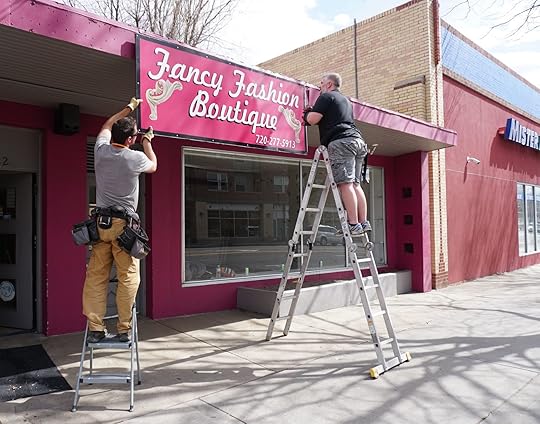
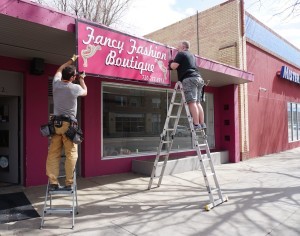
Taking down the old sign at the future MMM HQ building last month. Much more has changed since then!
In early April of 2011, I started a blog. Although I secretly hoped that lots of people would end up reading it, it was partly just a form of personal therapy – a place where I fight back against a world that had obviously lost its mind, by sharing some financial and living advice that should have already been obvious.
This weird hobby ended up being a pretty good idea, as it has blown up my life in many ways and made it even more satisfying. Early retirement is already a great thing, but enjoying a long, youthful retirement where you get to feel like you’re actually helping other people is far better. This website has served about 25 million unique visitors, and even the regulars are now in the seven digits. On top of that, I’ve had the honor (and sometimes embarrassment) of showing up in several bigger bits of media (some of them listed on this Media page).
But it’s tough to have such a big opportunity and still maintain a mostly-retired life. When you do the math, even a small bit of extra research and work on my part to make these articles more accurate and less haphazard, would provide much more benefit to these people than any inconvenience it would cause me.
Side note: The most powerful media boosts were not those stories in The New Yorker, TV News shows, or the Wall Street Journal like you’d expect, but rather an unscripted and rambling conversation on the Tim Ferriss Podcast – a sign of how much the world is changing beneath the feet of the old establishment.
Logically, this means that I really should be working on MMM project full-time, and have a big team of dedicated helpers. An even bigger site could create plenty of money to allow this and the work is very rewarding. That extra money could benefit a whole lot of people.
But I really don’t like sitting down and typing indoors all day. So instead I constantly choose to slack off by indulging in low-wage DIY construction work and spending time with family and friends. In the time since my last blog article, we bought an old building downtown and embarked upon a major renovation of it. But this construction project has in turn been interrupted by several visiting guests, a four-day snowboarding trip, and a flurry of local meetings. This week, my son and I spent about 4 hours developing some homemade rifle scopes for Nerf guns. There’s just so much to do in life besides the most “important” work.
The self-imposed pressure to always do more is a nag, but it would be ridiculous for me to ever complain about a life like this. So instead, I will just say “Thanks” for this first amazing six years, and here’s to our next sixty years of changing the world together.
And by “together” I mean, “You doing all the hard work of shifting to a a more badass, efficient, wealthy lifestyle while also converting your friends, while I hang out here in Longmont and occasionally type some shit into the computer to egg you on.”
Useful Stuff and News:
1: How to Find Stuff on Mr. Money Mustache or Anywhere else:
Many people send me emails asking for advice, not knowing I’ve already written about the subject in the past. To find past articles, try typing stuff like the following into your web browser:
site:mrmoneymustache.com 401k
site:mrmoneymustache.com car clowns
and so on. You can do this with any web site and find useful information in their old stuff very easily. For example, let’s search the entire “forum” section of this blog (since it has about 1.4 million different posts from over 32,000 registered members) for conversations about scholarships:
site:forum.mrmoneymustache.com scholarships
Or search every city in the entire US and beyond (via Craigslist) for used Nissan Leafs:
site:craigslist.org nissan leaf
Tangential Pro Tip: you can buy a car from someone you trust in another state, negotiate the deal however you like, then then get it shipped directly to you via companies like Uship – typically for under $1000. A great trick for casting a wider net!
2: Stuff I’ve been doing besides Writing Blog Posts:
Writing the Foreword to the upcoming “Your Money or Your Life”
Through good fortune and the Magic of the Internet, Vicki Robin, the author of the original book that brought Financial Independence into the consciousness of the modern world, has decided to write a new edition of the book and ended up joining forces with today’s happy circle of FI writers. She invited me to write the foreword to the new edition, which is obviously an amazing honor. I’ll let you know when the new version of Your Money Or Your Life comes out – it will surely become the new standard by which all other books on personal finance are judged. You can listen to Vicki’s moving story of a lifetime of activism in her interview on this podcast from our mutual friend The Mad Fientist.
Reading the Foreword to “The Simple Path to Wealth”
Yet another friend and all-around-good-guy Jim Collins wrote a great book on how simple stock investing is, and it turned out to be a stunning success. So successful that Jim told me he has been forced to massively increase his charitable giving program, which made me very happy. And so successful that the publishing industry came back to him to do an audio book version of The Simple Path, for use on Amazon’s Audible.com library.
Now, this book also happens to include a foreword from old Mr. Money Mustache. Since Jim is doing his own narration, they asked me to narrate my own foreword. I gladly agreed, and this has become yet another small but important task piled upon my Jenga tower of a life.
Pop-Up Business School Comes to America
On the last group Ecuador trip, I met a high-energy entrepreneurial British fellow named Alan Donegan who runs a school that trains people to start their own businesses – with very little money. He gave an impromptu session to the 25 or so of us on that trip, and we were all impressed and entertained.
So far, it has helped thousands of people in England, and he was thinking of trying it on this side of the pond. If we can get our act together quickly enough, we’ll host him here in Longmont this summer, and maybe in other cities as well. If you want to add your town to the list of stops, or support our effort here in Stashtown, you can find Alan through his Pop-up Business School website.
—
That’s it for the Birthday Edition. I’ll be back with new, better-than-ever articles just as soon as it’s time to take the next break from real life. I hope your Spring is going just as well.
Related Reading: How to Start a Blog





March 6, 2017
Inside Mrs. Money Mustache’s Top-Secret Five-Figure Etsy Shop
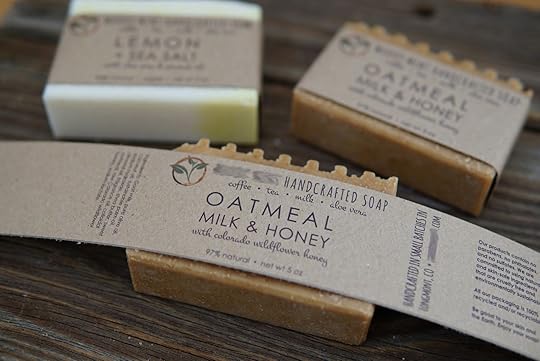
 For the past two years or so I’ve been keeping a secret from you, and I think today it is finally time to spill the beans.
For the past two years or so I’ve been keeping a secret from you, and I think today it is finally time to spill the beans.
The secret is that my wife is no longer really retired, and in fact she started a business that is now big enough to fund our entire family’s lifestyle. Making this confession will subject both of us to the full fury of the Internet Retirement Police. But it’s worth it, because there are some valuable lessons in her experience that could be useful to other people hoping to take control of their own income.
I’m always fascinated and happy to see people making money through self-employment, (especially in fields that don’t require a university degree) because it presents a nice shortcut around most of the problems that the world of work presents to us. Prefer to set your own schedule? Go right ahead. Unhappy with work conditions? Change them. Want a raise? Company profits are under your control. Don’t like your boss? Just find a mirror and have a quick word with yourself. Sure, there are loads of great jobs out there, but conventional employment is often only a small, boring slice of a life’s work experience.
The Etsy Shop
You’ve almost certainly heard of Etsy, a highly popular online marketplace that specializes in handmade, small batch products – most often produced by a single person. Almost everything there is cute, unique, and custom, which makes it a hit in the gift-giving and personal pampering markets. And because the focus is on small entrepreneurial business and relatively natural products, even Mr. Money Mustache can get behind the general theme without too much grumbling about clueless consumers.
My wife was a fan and an occasional customer, but also became curious about just how difficult it would be to make some of the things that were for sale – often at relatively high prices. So she launched an investigation, which has led to two years of fun and learning, and is still growing.
Update: When I first posted this article, we asked people to please avoid trying to track down her Etsy shop, just to keep her experiment realistic. A small percentage of good-hearted but mischievous Mustachians disregarded this request and flooded her shop with orders anyway. Almost her entire current soap inventory (over $1000 worth) was quickly sold out. So if you do find her shop, you’ll only see a few remaining products for now. You’ll have to use your imagination to picture what it usually looks like – an array of 20 different fancy looking soaps and other products.
So to continue this tale, let’s launch into an interview with the lady herself.
An Interview With an Etsy Entrepreneur
Mr. Money Mustache: Hello there wife! Thanks so much for allowing me to do this interview with you – I know you’re normally not a fan of the public eye.
So to start things off, what is it exactly that tempted you to get into the business of being an Etsy seller in the first place?
Mrs. Money Mustache: Hello husband! It is strange and fun to be back on the blog, so thanks for doing this article.
Becoming an Etsy Seller was a gradual process, as it is with many folks, I suspect. I was sitting around being all retired and, frankly, I was bored sometimes. At the time, I didn’t have a real plan for all my free time.
One day, while standing with a group of parents at the after-school pickup, I became enamored with these lovely wrap bracelets with pretty beads all the moms seemed to be wearing. I hadn’t seen them before and became curious, so I started shopping online. I found out they cost a small fortune and, not really being a jewelry person, I quickly dismissed the purchase.
But, upon further review, I saw they were selling on Etsy and this prompted me to think I could make one myself. So, I dove down into a rabbit hole of watching videos and buying supplies and I was hooked. Learning and making really filled a void in my life, so I went a little crazy. I made a bunch of bracelets, gave them to friends, and at a certain point, I had spent more than I felt comfortable on the whole endeavor.
This is when I came back to Etsy and the idea of selling was born. I figured if I could sell enough of these bracelets I had learned to make, I could pay myself back for all the stuff I had bought to make them recreationally.
MMM: Wow, that’s interesting – selling as an atonement for consumer guilt? It sounds negative when you put it that way, but it seems to have become a big positive in your life. So anyway, what date was this?
Mrs. MM: This was in April of 2014. That’s when I started my first shop.
MMM: How long did it take to get your first sale? And how have your sales ramped up since then? What was your busiest month so far?
Mrs. MM: It definitely took a while to get my first sale. About 2.5 months after first opening my shop. But, I was so busy making items and learning about Etsy that I didn’t really notice the time pass. I remember it was a holiday-specific item (a fourth of July bracelet) and that’s when I realized the importance of holidays in retail (duh!)
My sales increased really slowly over time. I did so much research by lurking around in the Etsy forums and finding out what makes other shops successful. I created a lot of different products (necklaces, bracelets, guitar picks, even crocheted dish cloths!) so I could test them out and see which were successful. A wise man once said: “Work is better when you don’t need the money.” and he was right. :) I was able to do a lot more than a shop that can’t invest much due to money constraints.
My busiest time, by far, was the holiday season of 2015. In November and December of 2015 I was so busy that I couldn’t keep up and had to place my shop on vacation mode (Etsy has an option for that, which basically means: I’m not open for business at the moment.) During just those two months I sold about $10,000 of stuff. I was working constantly and it got in the way of family time and I realized I needed more balance.
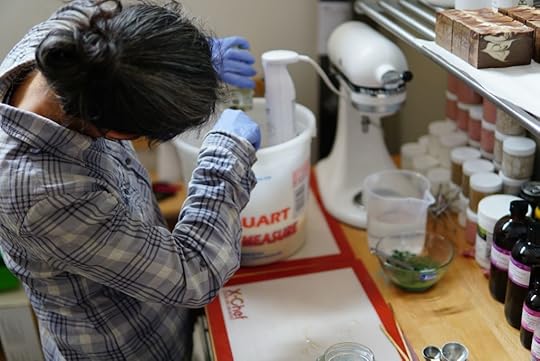
Blending various fancy oils in the home workshop, with a stick blender.
MMM: I noticed that even after your first shop became fairly successful, you actually started a second Etsy shop. What was the cause of this? How has the experience been, compared to the first?
Mrs. MM: Yes! I decided to start a second Etsy shop in August 2016. As an Etsy Seller, I really wanted to support other Etsy sellers, so I started buying stuff from them quite a bit. I purchased almost all my shop supplies on Etsy and I also started buying small gifts.
One year, I bought some handmade soaps for family members at Christmas and tried one out myself. I fell in love with it and realized how much better my skin felt. Of course, as a crazy-researcher-type (which is what I realize I am, post retirement), I decided to try making my own soap. This led to a second love and once I felt confident in my products, I opened my second shop, which sells mostly natural bath and body products (soaps, scrubs, lotions, and oils).
This second shop is so much more fun than the first. For one thing, I am making products that I love using myself and really believe in. I also had so much experience at making my first shop successful that the second one was much easier. I had a few customers that shopped at my first shop that immediately bought from my second shop. So, that first sale came much faster.
I also really love the “soaping community”. All the soapers I’ve met through Instagram (which is a platform I used to hate and now love) are so generous with time and information and they make beautiful products too. It’s just a completely different (and more fulfilling) experience this time around.
MMM: How do you decide what to make and what to sell – and which products to discontinue?
Mrs. MM: In both shops, I try a lot of different things. I follow my own feelings of what I’d like to wear or use. I like to make new items and sometimes they do really well and sometimes they don’t. I also find that in the bath & body world, you get repeat customers much more easily. So, they will let me know what they want more of, which has led me to keep products that I wasn’t sure if I should continue and making new ones.
I also follow my values. For example, right now many of my bath and body products are all natural, but I’ve also tried using ingredients that aren’t considered natural. I like to experiment and decide for myself what I like. But, after dabbling in fragrance oils and other “not 100% natural” ingredients, I find myself veering back towards all-natural. I’m trying out a lot of different packaging and am finding that this is a challenge as well, as I want everything to be eco-friendly, but also reasonably priced.
So, I guess I discontinue items that aren’t doing well and that I’m not a huge fan of either. But, I will always make new things (because that’s the fun part), so I will always want to sell new items along with the ones that stay on and sell well.
MMM: What are the factors in your success – Is this something just anybody can do? If not, what skills or personal tendencies do you think would create a good Etsy shop owner?

To get nicer photos like this, she had to figure out lighting, background, and camera. For both Etsy and MMM purposes, we upgraded to a Sony alpha6300 with separate Sigma prime F/1.4 lens. I love the camera – takes amazing film-quality videos too.
Mrs. MM: My success (or, my definition of success anyway) is probably due to incessant research. I am always researching. I read a lot and look at a lot of other shops and try to figure stuff out. It’s a fun puzzle and I think it is the most interesting part of owning an Etsy shop for me. I would get bored if I wasn’t doing that. The business half of my degree is finally coming in handy!
To be successful on Etsy, you need to understand how SEO (search engine optimization) works. Etsy has their own search engine, so you just need to figure out how to make your listings show up near the top, which is easier said than done!
Once you know that, you need beautiful pictures so that people actually click on your listing. Again, this takes a lot of research and some photography skills. I look at every single picture in a search result and figure out what makes me click on an image. I also look at my listing in that list and see if it stands out.
For example: I recently realized that I was clicking more on photos of soap with packaging than “naked soap”, so I changed one of my listings so that the first photo had packaging – and it did result in more sales.
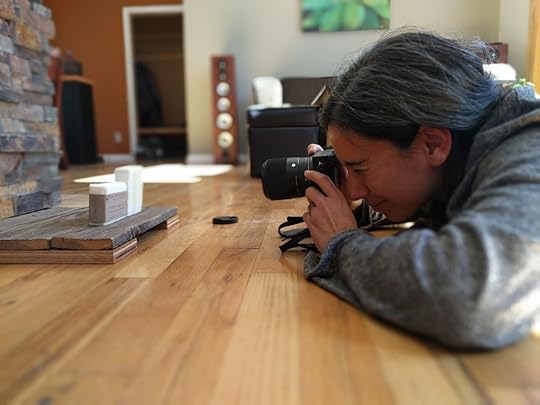
Doing what it takes to get the shot.
SEO and quality photos are the two biggest things. After that, you need to give excellent customer service and ship your packages out in time. It helps if your packages look cute upon arrival too. That leads to good reviews and word of mouth, which leads to more sales.
MMM: What has been the biggest unexpected positive, and negative, in your experience in dealing with customers?
Mrs. MM: The biggest positive has come from my second shop, as I have built up repeat customers in a relatively short amount of time. These are people that leave me incredible reviews, send me a message that brightens my day, post their purchases on Instagram, etc. I am very surprised by this, but it does bring me a lot of joy.
The negatives used to affect me a lot, but I’ve learned that they will always be there. There are people that leave one star reviews without contacting me first. People can be pretty brutal when reviewing a product. I don’t think they realize they are leaving a review to a single person (as opposed to a company). It’s one thing to say “Amazon sucks”, but when someone says “You suck”, that’s totally different. Sometimes they are folks that own a competing shop on Etsy (or have a friend that does), so you know the review isn’t even accurate or relevant, but it still sits there staring you in the face.
MMM: I hear you on that Mean Internet Strangers thing. Sometimes I stumble across multi-page discussions on Reddit or Bogleheads, among people I’ve never met, who are just making the most bizarre and pessimistic speculations about our personal lives, or my motivation for writing the blog, or whatever. There is no practical way to set everyone straight, so you really just have to develop a thicker skin instead.
Mrs. MM: I think it’s a bit easier in the smaller world of an Etsy shop. There are also a lot of difficult customers, but I always answer all their questions and do my best and some of them have actually made large purchases or become repeat customers. One of my best customers in my second shop was someone that was previously difficult.
MMM: What do you think the upper limit on profit would be in an etsy shop? Do any of your role models or competitors seem to be running pretty big operations?
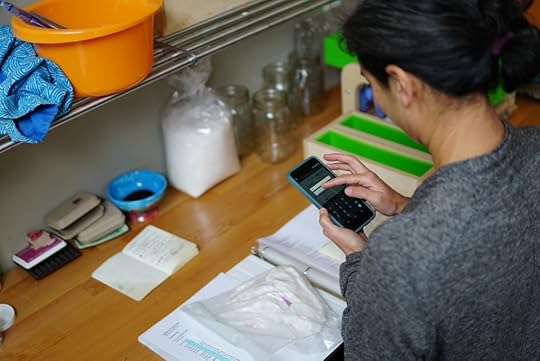
Doing the Math
Mrs. MM: The sky is the limit! There are many shops on Etsy that started off as one-person endeavors and now they own huge businesses with many employees. Most of them move on from Etsy and start their own web sites, which makes sense as they no longer need the Etsy platform to generate sales.
Etsy also has rules about manufacturing help and the handmade nature of items, so if you get big and want to start selling different things, it makes sense to move on.
That’s not the goal for me, although I might use a helper during the holidays sometimes. (MMM himself has been known to sit on the couch and cut out hundreds of cardboard squares for my packaging material)
My goal is to keep making and to keep learning… not to have a huge money-making operation. My word for 2017 is ‘balance’. :)
I should also add that on the lower end, it’s very easy to make nothing, or even lose money on an Etsy shop. There’s a lot of competition, so it is not easy to get established. Hard work and endless patience are essential to get through that painful first year.
MMM: Hmm, there were no numbers in your answer, but I guess we don’t really know how any of those huge Etsy sellers personally. But based on their photographs of daily production I’d estimate that the upper limit might be in the $200,000 range of annual profit for a single-person shop. $1000 per day in sales, minus about 33% in cost of materials and other overhead.
But as you say, shops can get much bigger than that – they just usually leave Etsy, hire some employees, and expand into a standalone operation.
So let’s talk about your situation instead – what’s the net hourly profit you would say you make at this stage, now that you are established?
Mrs. MM: Hmmm… that’s tricky because I keep wanting to make new things, so I am spending more than I would be if I were purely profit-driven. My first shop is at a stage where my profits are very good compared to my revenue because I’ve lost a bit of interest in that shop and am not spending much on it. Hourly, I’m guessing around $30 per hour. However, as a result of me losing interest, it has slowed down quite a bit and it is actually “on vacation” on Etsy at the moment.
My second shop is still in the growing stages, so profits are not that great at the moment. I’m also finally at a place where my prices are set where I want them to be. My up front investment was quite big and soap takes 4-6 weeks to cure, so that shop is still up in the air, profit-wise. But, I’m guessing it will become more profitable on an hourly basis than my first shop once I ramp up my operations by making larger batches (less time spent and supplies cost less when bought in bulk).
So yeah, good question. I guess my answer is: “I’m not sure. I should probably calculate that.”
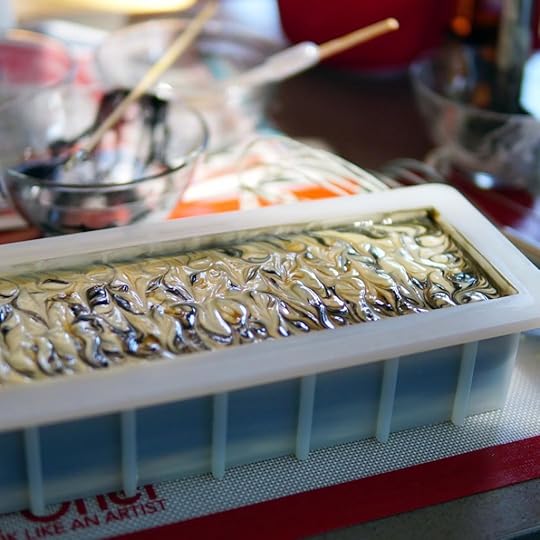
A freshly poured batch of soap. This hardens overnight, and you cut it into 16 bars. 4 weeks later, it is cured and ready to sell.
For example, to make a 5 pound batch of soap (a “loaf”) takes about $20 worth of materials if you are using high-end stuff like coconut and olive oils. This takes roughly 2 hours of labor by the time you make it, clean up, and later cut and package the soap. You end up with 16 bars, which sell on Etsy for $6 each. So, your profit is about $80, for roughly two hours of work. But that work is spread over a month, so you need make a bunch of batches to keep things in stock.
MMM: Where do you see this hobby taking you?
Mrs. MM: Ultimately, I want to be able to use this hobby for community building. I imagine owning a store somewhere on Main Street that sells my products, but also empowers others to make. I see myself teaching others how to make their own things and how to start their own shops. I see myself making alongside others and having this ongoing conversation about our common problems and our successes. I imagine connecting with other makers in a community space. I see us all teaching kids that you can make instead of buy, create instead of consume. You can own your own business while also doing the things you enjoy.
MMM (update): During the casual yearlong process of working on this article, we ended up stumbling upon an interesting, underpriced old building on Main Street, and are now about to purchase it. It will make for some interesting stories (and parties too), so I’ll keep you posted on that.
Mrs. MM: The maker’s movement is huge and is having a big resurgence in our modern lives. I am the type of person that never considered myself “creative”. I still wouldn’t use that word to describe myself, but I am now a handmade maker. I make stuff with my hands and they are sometimes even useful things! You can do it too!
I would love to go back in time (or forward in time) and live in a world where everyone is a maker of things and we just make and trade with each other. The simplicity and the community of that framework really appeals to me and it gets at the root of what makes us human.
MMM: During these past two years, I have mentioned your growing Etsy hobby, but never told anyone how to find your shop. And even with this article, I still want to encourage readers not to go out and try to find her shop on Etsy. We both felt that doing so would be a form of “cheating”. Can you explain this philosophy?
Mrs. MM: It was really important for me to create my own success, independently. Success isn’t as fulfilling if you cheat! I’m pretty sure that almost every single person who purchased from me didn’t know my secret identity and that feels good.
I’ve built all of this myself, from scratch. I’ve also learned that many people will pay big bucks to cheat the system (whether it is online selling, blogging, etc). I’ve found that the harder, longer road, is always better in the end.
MMM: That’s really cool. And it’s also more educational for you. As a relatively high achiever with skills in software and technology, and no financial pressure, it can be argued that you are already “cheating” compared to most Etsy sellers.
But if you do it right, financial independence is the good kind of cheating – you preserve the learning and effort, but cut off the stress and any temptation to create shortcuts.
And even without financial independence, entrepreneurship is a huge advantage to add to your collection of life experiences. I have a bunch more stories of entrepreneurial friends I’ve been wanting to share with you, so let’s do it in the months to come.
Somewhat Related Reading:
50 Jobs over $50,000 – Without a Degree
Interview with a CEO – Ridiculous Student Loans vs. the Future of Education





Mr. Money Mustache's Blog
- Mr. Money Mustache's profile
- 60 followers


